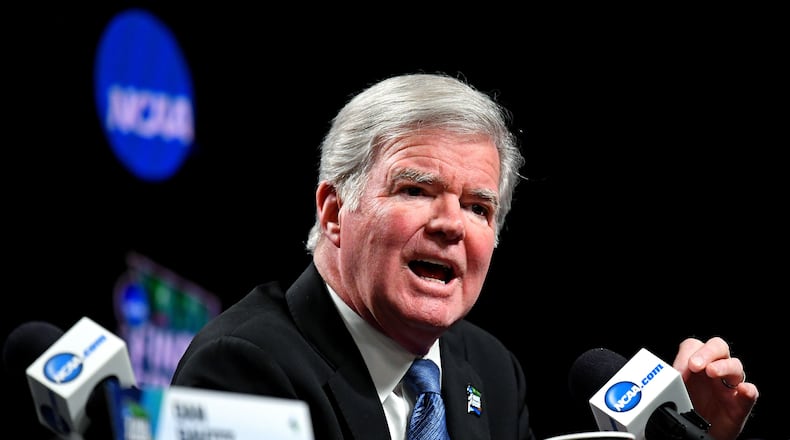NCAA athletes who generate nearly $1 billion in television revenue don’t earn their market value because no one in power advocates for their interests. That’s changing in California, where state lawmakers are considering a bill that would allow athletes to own the rights to their names, image and likeness (NIL) beginning in 2023. This worries NCAA president Mark Emmert, whose job is to ensure athletes don’t earn their true monetary value so people like him can keep making unearned money off their labor and marketing power.
So Emmert sent a letter to committee chairs in the California Assembly asking them to “postpone further consideration” of the bill while the NCAA studies how to throw players a bone for NIL while not fundamentally changing the NCAA’s exploitative model. Emmert wrote that the bill “threatens to alter materially the principles of intercollegiate athletics and create local differences that would make it impossible to host fair national championships."
In other words, if California makes it the law that the state’s NCAA athletes can be be paid for their NIL, then the state won’t get to host championships. Emmert’s letter further implied that all athletes at the state’s NCAA schools could be ruled ineligible if the NIL law comes to pass.
Emmert clearly is bluffing. California lawmakers should call him on it if they really are looking out for the interests of athletes.
The NCAA won’t ban California schools from hosting championships or prevent its schools from competing. The Rose Bowl is scheduled to host the College Football Playoff Championship game in 2023. The Pac-12 has two schools in Los Angeles (USC and UCLA) and two in the San Francisco Bay Area (Stanford and Cal).
You think the NCAA would ever tell its television partners that it won’t play big games or have Power Five schools in the country’s second- and eighth-largest media markets, respectively? Emmert’s empty threats reek of desperation.
The NCAA is worried that if California passes its NIL law, other states will follow suit. The first time a coveted recruit rejects a program in a football-mad state and heads West for endorsement cash, legislatures from those states would quickly pass NIL laws to match California’s. Remember when the Georgia legislature rushed to change the state’s open-records laws after Bulldogs coach Kirby Smart claimed, without evidence, that the old law put his program at a competitive disadvantage?
California’s NIL law would be just the beginning. Next thing you know a state would pass a law allowing NCAA schools to pay athletes market salaries, then other states would match it. The NCAA also must fend off federal intervention: in March, U.S. Rep Mark Walker (R-N.C.) introduced a bipartisan bill that would end NCAA restrictions on player compensation for NIL.
In his letter to California lawmakers Emmert wrote that there are “complex issues” for the NCAA to consider with NIL. But his problem is that this matter is simple to grasp. Everyone can see why it’s unfair that athletes don’t control their NIL and aren’t compensated for its commercial use. Emmert knows NIL is the issue most likely to lead to serious reforms for the NCAA’s sham “amateur” model.
The NCAA is trying to delay the inevitable. It’s been in trouble on this issue since its 2014 loss in the antitrust case filed by former UCLA basketball player Ed O’Bannon on behalf of Division I football and basketball players. He was angry that his likeness was used in a video game without his permission while the NCAA made millions in licensing fees.
It would have been very profitable for NCAA schools to make a deal with players regarding their NIL for the video games. They made millions in licensing fees from the basketball and (especially) football games. Electronic Arts indicated that it was willing to continue paying fees, with players getting a cut.
But the NCAA stopped licensing the video games altogether. Its schools forfeited millions in profit rather than allow players to earn a dime of licensing fees from video games. That’s because doing so could be the first step toward the NCAA’s nightmare: athletes earning their true worth and leaving less money for Emmert (2017 salary: $2.9 million) and the various other administrators who freeload off the work and entertainment draw of athletes.
The NCAA’s opposition to the California bill also exposes the dishonesty of its main arguments against paying players. It claims that fans would reject its product if players are paid because “amateurism is an essential component of college sports.” The Supreme Court bought that argument in a 1984 case, with the majority writing: “To preserve the character and quality of the ‘product,’ athletes must not be paid.”
But big-time NCAA programs got a lot greedier over the past 35 years and polling now shows that most of the public support college players earning money for their NIL. Two-thirds of respondents to a 2017 Washington Post-UMass Lowell poll agreed that college athletes should be paid “when their name or image is used in video games or to sell merchandise” with 36 percent against it. The NCAA could allow players to sign endorsement deals with little backlash from consumers, who already see NCAA players heavily commercialized in marketing by schools and television partners.
This change in public sentiment is prompting California lawmakers to push the issue on NIL. They should dismiss Emmert’s amateurish attempt to threaten them and give basketball and football athletes back what the NCAA takes away: the rights to their names, image and likeness.
About the Author
The Latest
Featured


